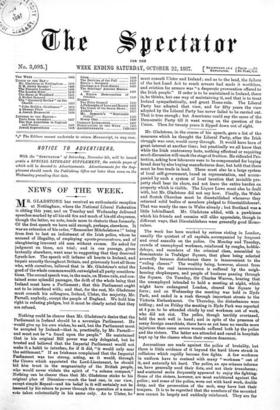Nothing could be clearer than Mr. Gladstone's desire that the
Parliament in Ireland should be a sovereign Parliament. He would give up his own wishes, he said, but the Parliament must be accepted by Ireland—that is, practically, by Mr. Parnell— and must not be "a fraud upon the people." He maintained that in his original Bill power was only delegated, but he trusted and believed that the Imperial Parliament would not make it a habit to interfere, for if it did, "it would only mar the settlement." If an Irishman complained that the Imperial Parliament was too strong, acting, as it would, through the Crown which appointed the Lord-Lieutenant, he should bid him trust in the magnanimity of the British people, who would never violate the spirit of "a solemn compact." Nothing can be clearer than that Mr. Gladstone sticks to his original plan of Disunion—much the best one, in our view, except simple Repeal—and his belief in it will certainly not be lessened by his return to power through the operation of a mass vote taken substantially in his name only. As to Ulster, he must consult Ulster and Ireland ; and as to the land, the failure of the last Land Act to remit arrears had made it worthless, and eviction for arrears was "a desperate provocation offered to the Irish people." If order is to be maintained in Ireland, there is, he thinks, but one way of maintaining it, and that is to treat Ireland sympathetically, and grant Home-rule. The Liberal Party has adopted that view, and for fifty years the view adopted by the Liberal Party has never failed to be carried out. That is true enough ; but Americans could say the same of the Democratic Party till it went wrong on the question of the Union. Then for twenty years it dipped down out of eight.






































